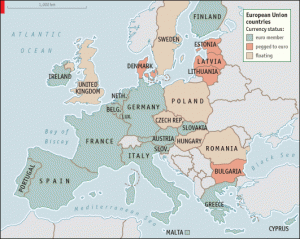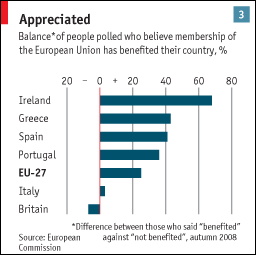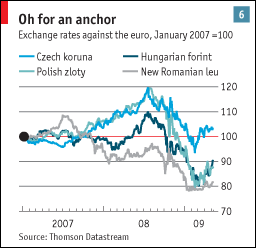July 3rd 2009
Will the Euro Survive the Credit Crisis?
The Euro has always had a marginal group of naysayers; there were always those who insisted that a common currency didn’t make sense for a region as diverse as the EU. As a result of the credit crisis, a bevy of critics have come out of the woodwork and declared that the Euro will not survive its first official crisis. Are they right?
According to a Special Report on the Euro Area published in the Economist (which inspired this post), the Euro has been a modest success by most measures. “The ECB has fulfilled its remit to maintain the purchasing power of the euro. Since the currency’s creation the average inflation rate in the euro area has been just over 2%. Fears that the euro would be a “soft” currency have proved unfounded. It is unquestioningly accepted at home and widely used beyond the euro area’s borders.” While the Euro hasn’t facilitated meaningful gains in productivity or GDP, it has unquestionably engendered greater stability.

Ironically, the countries that are now complaining the loudest about the Euro are mainly those that benefited the most from its membership. The economy of Spain, for example, “grew at an average annual rate of 3.9% between 1999 and 2007, almost twice the euro-zone average and much faster than in any of the currency area’s other big countries…Unemployment fell from close to 20% in the mid-1990s to just 7.9% in 2007.”
Unfortunately, the economic boom also corresponded with a rise in prices and unit wage costs, both of which are now proving to be particularly painful in the context of recession. Aided by a strong currency, its current account deficit has risen to 10% of GDP. Meanwhile, the same problems are affecting Portugal, Ireland, Italy, and Greece. As the report explains, “The main hazard for investors in high-inflation countries—that a steady loss of domestic purchasing power will drag the currency down—is eliminated in a fixed-exchange-rate zone.”
A country with an independent monetary authority would normally deal with these problems by raising interest rates and/or devaluing the currency. Actually, given how extreme the imbalances are in some of these countries, the markets probably would have accomplished this for them. In this case, however, their membership in the EU and their deference of monetary power to the European Central Bank precludes such possibilities. As a result, the main solutions will have to be originate in the political arena. Wages will have to become more flexible, and labor market controls will have to be loosened, in order to increase productivity.
The alternative – leaving the Euro zone- is unthinkable. “The costs of backing out of the euro are hard to calculate but would certainly be heavy. The mere whiff of devaluation would cause a bank run: people would scramble to deposit their euros with foreign banks to avoid forced conversion to the new, weaker currency. Bondholders would shun the debt of the departing country, and funding of budget deficits and maturing debt would be suspended.” As a result, borrowing costs would increase drastically, which could induce a wage-price spiral. Inflation and currency stability would be tenuous, at best. As a result, it’s not surprising that in most Euro member states, polled citizens remain strongly in favor of the Euro.

In addition, those on the cusp of joining remain firmly committed to doing so. For such economies, the economic crisis has actually strengthened the case for Euro membership. “As emerging economies they are prone to sudden shifts in foreign-investor sentiment, which makes for volatile currencies, so exchange-rate stability holds considerable appeal for them.” Romania and several baltic states have already had to go hat-in-hands to the EU and IMF to ask for assistance in order to stave off a complete loss of investor confidence. Poland is also vulnerable to currency decline, since many of its loans are denominated in foreign currency; it is currently aiming for Euro membership in 2012.

Concludes the Economist, “For all its shortcomings, the euro zone is far more likely to expand than shrink over the next decade. Most EU countries that remain outside, bar Britain and Sweden, are eager to join.” This is certainly a bit glib, and ignores the imbalances that the currency is at least partially responsible for. Still, the tentative consensus is accepting of the Euro. It’s like the old joke about capitalism – “it’s the worst system– except for all of the others…”




July 7th, 2009 at 11:52 pm
IF UK joins fully and supports euro to the core, then euro will rule next few decades.
thanks